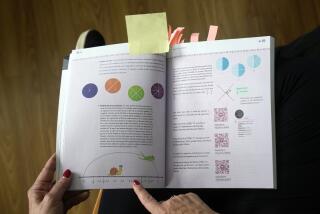S. Korea Sees a Textbook Case of Whitewash
- Share via
SEOUL — South Korea ratcheted up its dispute with Japan over a controversial textbook Monday by announcing the recall of its ambassador over what it sees as a historical whitewash.
South Korea, China and several nations in Southeast Asia say the junior high teaching materials gloss over the brutality of Japan’s wartime past.
On Monday, protesters in Seoul burned Japanese products and an effigy of a Japanese. Civic groups called on Korean consumers to boycott Japanese products. The government also pledged to raise the issue at a United Nations human rights meeting today, although it said the recall of its ambassador was only temporary.
The textbook, written by a nationalist group called the Japanese Society for History Textbook Reform, was approved last week by Japan’s Education Ministry after 137 passages were changed or deleted. Education officials hoped that the revisions would mollify critics inside and outside Japan.
On the streets of Seoul, Koreans sharply criticized the revised textbook and the thinking behind it.
“It’s really very simple--we’re living in a global era, and Japan should judge itself in those terms,” said Ko Kyung Woo, a 58-year-old newspaper vendor. “Forget about Korea, other countries don’t accept Japan’s view of history, either.”
The controversy has put the Korean government in a tough spot. It wants to keep relations with Tokyo on track. In 1998, after President Kim Dae Jung visited Japan, both sides agreed to downplay long-standing differences in the interest of better trade and diplomatic ties.
However, Seoul also faces charges at home that it is being too soft on Japan, particularly compared with the Chinese.
Some Koreans take a more philosophical view. Yang Jung Oh, a 26-year-old businessman, said Monday that both governments share the blame for allowing extremists to hijack the issue.
“In Japan, nationalists maneuvered the treatment of history for their own purposes, and the government didn’t effectively respond,” he said. “In many ways, it’s the same in Korea.”
Asian nations have been through similar incidents several times before, as Japanese officials periodically make comments justifying their nation’s role in World War II or use language insulting to other Asians. What some critics find troubling this time is Japan’s apparent drift back to the right.
In 1996, all seven history textbooks approved by the Education Ministry acknowledged the existence of “comfort women”--a euphemism for the tens of thousands of Asian women forced into sexual slavery by the Japanese army during the war.
This year, only three of the eight newly approved history books do. The textbook written by the Japanese Society for History Textbook Reform is among those that make no mention of the comfort women.
China’s official New China News Agency said the text showed that “a handful of ultra-rightist forces are still trying by any means possible to reverse the verdict on Japan’s wars of aggression, a verdict based on conclusive evidence.”
Criticism has not been confined to foreign countries. Last month, a Japanese group known as the Liaison Meeting of Returning Veterans from China strongly denounced the 337-page textbook, which is scheduled to become part of the Japanese curriculum next year.
“We are trying to help educate young people in the correct history,” Tetsuro Takahashi, the group’s secretary-general, said in a news conference. “Even young teachers nowadays don’t know about the war.”
Among the 137 revisions are changes made to sections on the 1910-1945 occupation of Korea and the 1937 Nanjing massacre in China.
The draft of the textbook said that Japan’s annexation of Korea was supported by Western powers and that the occupation “was necessary to defend Japan’s security.” Those references were deleted in the final version.
*
Rie Sasaki in The Times’ Tokyo Bureau contributed to this report.
More to Read
Sign up for Essential California
The most important California stories and recommendations in your inbox every morning.
You may occasionally receive promotional content from the Los Angeles Times.













